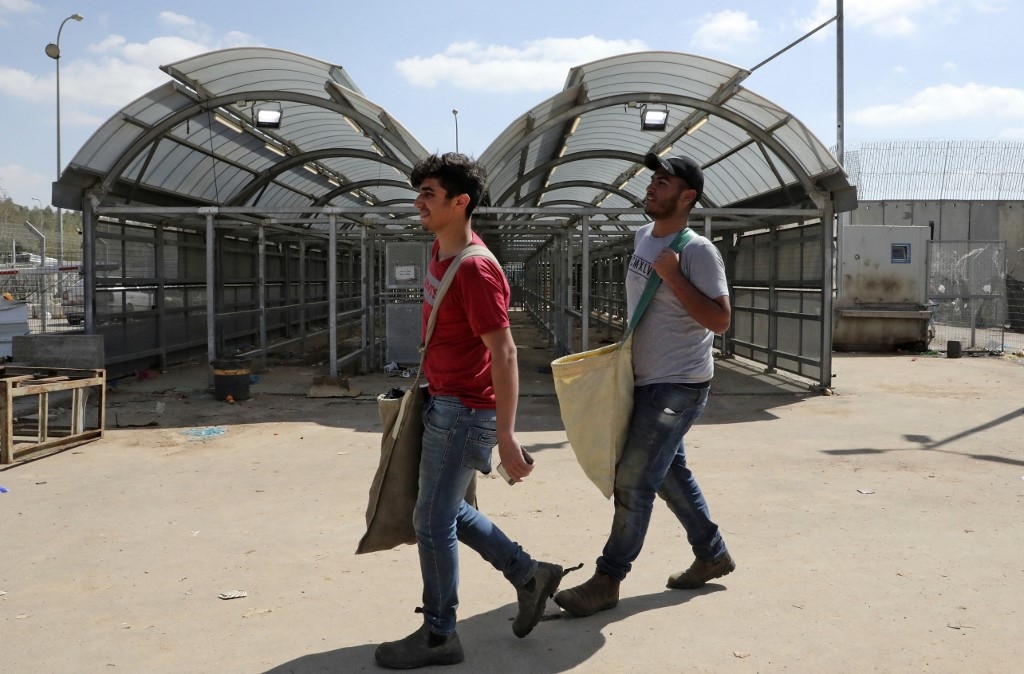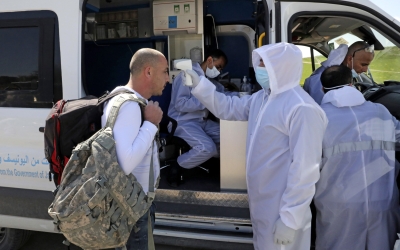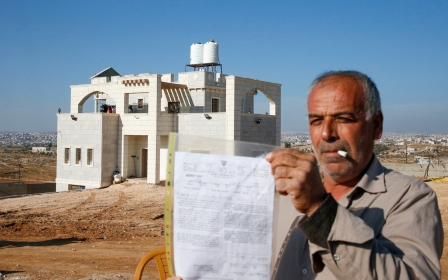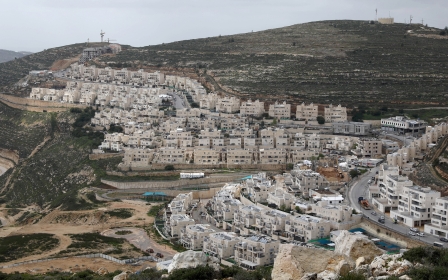Coronavirus: Palestinian workers set to return to Israel despite health risks

A decision to allow Palestinian labourers back into Israel has sparked a new round of contention in the occupied West Bank, with many Palestinian citizens expressing their frustration over the new health risks the labourers could pose in the midst of the coronavirus outbreak.
Thousands of Palestinian labourers are gearing up to return to Israel just weeks after they were ordered by the Palestinian government in the West Bank to leave in protest against the "inhumane" treatment of workers.
"When I heard the news I was shocked and disappointed," Mohammed Abu Srour, a local activist from Bethlehem, told Middle East Eye. "The last time they let the workers go to Israel was a huge disaster.
"We understand that the workers are suffering financially, and they need to make money for their families," he said. "But they have to take into consideration how they are putting themselves, their loved ones, and the rest of Palestine in danger."
According to Israeli and Palestinian media reports, the Israeli government will be opening its borders on Sunday to Palestinian labourers with Israeli work permits for "essential" sectors such as construction.
New MEE newsletter: Jerusalem Dispatch
Sign up to get the latest insights and analysis on Israel-Palestine, alongside Turkey Unpacked and other MEE newsletters
The workers will reportedly be given one day to cross into Israel. They will then have to stay for the remainder of the month.

The plan seems eerily similar to efforts made by Israel and the Palestinian Authority (PA) last month following the coronavirus lockdown, which ended up taking a turn for the worse.
Instead of providing labourers with proper food and housing accommodations for at least two months, Israeli authorities and private employers began dumping Palestinian workers who were exhibiting symptoms of Covid-19 at checkpoints along the Green Line, just days after they had entered the country.
At the time, the issue sparked a nation-wide debate, with many Palestinian citizens and rights groups criticising both Israel and the PA for their failure to ensure the safety of the workers, and expressing concern for the rest of the Palestinian citizens living in the West Bank, who were suddenly being exposed to potentially sick workers returning home from Israel.
'No other choice'
As the deadline for labourers to travel into Israel draws closer, Palestinians planning to cross the border are getting ready to set off on a journey while being unsure of how it will end.
Ali, who declined to reveal his last name due to security reasons, is one of those Palestinians planning to make the journey.
A young Palestinian man in his early 30s, Ali is the sole caregiver of his widowed mother. Like much of the rest of his hometown of Bethlehem, Ali relied on the tourism industry for work, and when the city was put under lockdown due to Covid-19, he lost his job.

"I have been building my house for the past few years, and have a lot of payments that I need to make," Ali said, adding that all of his cheques over the past two months have bounced.
"With no income, and payments piling up, I am more than 10,000 shekels [$2,850] in debt," he said. "So when I heard about the borders opening for workers, I knew I had no other choice."
Despite witnessing the conditions that labourers have been subjected to recently, and having very low expectations of the Israeli government and employers, Ali said he is going to go through with his plan.
"As a Palestinian, I have never trusted the Israeli government with my life, so of course I don't trust them to protect my rights or my health," he said. "But this is the only option I have to keep me and my family afloat."
Abu Srour expressed similar sentiments, saying: "I don't think this time will be different. Nothing will ever be different with Israel.
"They don't care about the Palestinian workers or their rights. They just want to protect their economy and their businesses," he said, adding that the abuse of workers rights was routine practice in Israel even before the coronavirus pandemic.
"Israel doesn't care about the rights of any Palestinians. Not workers, prisoners, children, our rights to movement and freedom, etc. So why would they suddenly start now?" Abu Srour asked.
Health risks
Within Palestinian society, along with the fears of what will happen to the workers when they cross into Israel is the thought of what will happen to the rest of the population upon their return.
Following the return of thousands of workers last month, the number of coronavirus cases in the West Bank surged, with groups reporting that the majority of cases have involved either workers themselves or people who have been in contact with them.
The Palestinian Authority reported at the start of the week that there were then 495 Palestinian coronavirus patients in the West Bank, the Gaza Strip and in Israeli-governed East Jerusalem, with 295 of these from the Jerusalem area and 17 in Gaza. Dozens had also recovered from the disease, though some had become sick again, Palestinian Prime Minister Mohammad Shtayyeh said on Monday.
The first coronavirus death in the West Bank was a woman whose son had recently returned from working in Israel.
While the Palestinian Authority has not made any official statements on the matter, the head of the Palestinian labour office in Bethlehem, Ayman Odeh, told MEE that the PA did have an agreement with the Israeli government and was helping to coordinate the departure and return of the labourers.
"We agreed with the Israeli government that the entry of every labourer who works in construction and agriculture will be coordinated with the Israeli authorities, down to the time and place of entry," Odeh said.
According to Odeh, the agreement also states that labourers will be tested by the PA upon their return, and that labourers will be called back to the West Bank in time for the Eid holidays marking the end of Ramadan, expected this year on 22 May.
The prospect of labourers returning for the Eid holidays has only sparked more fear among residents of the West Bank.
"If they are planning on bringing the workers back for Eid, it's going to be a disaster," Abu Srour said, noting that visiting one's family is one of the biggest traditions of the holiday.
"We hope the workers can understand the risk they are posing to the community," Abu Srour said. "We can't afford a repeat of what happened last time."
Middle East Eye delivers independent and unrivalled coverage and analysis of the Middle East, North Africa and beyond. To learn more about republishing this content and the associated fees, please fill out this form. More about MEE can be found here.





